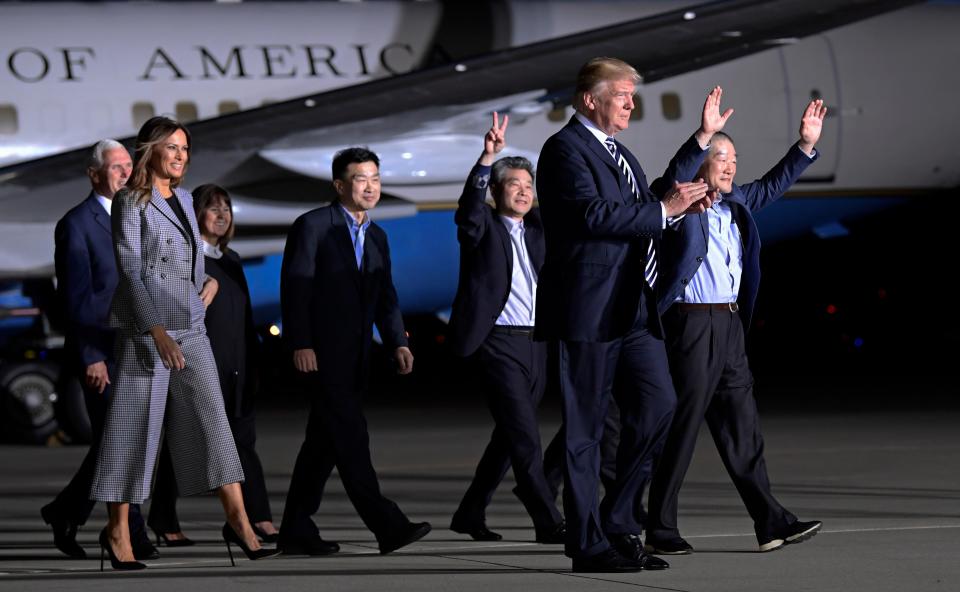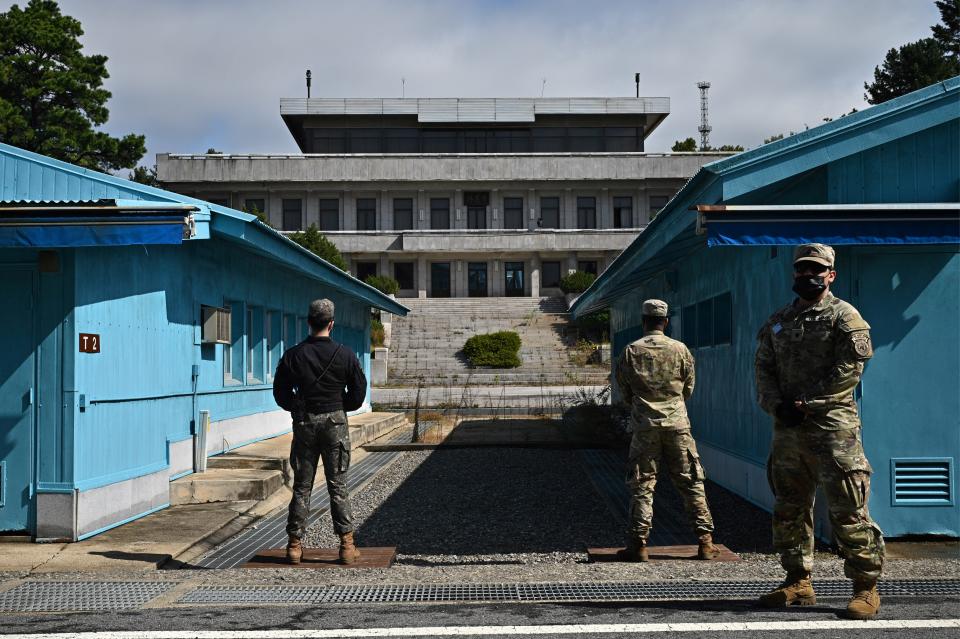Trump got detained Americans back from North Korea. For Biden, it won't be so easy.
- Oops!Something went wrong.Please try again later.
- Oops!Something went wrong.Please try again later.
- Oops!Something went wrong.Please try again later.
- Oops!Something went wrong.Please try again later.
WASHINGTON — Weeks before a planned summit with Kim Jong Un in 2018, a gleeful President Donald Trump welcomed back three detained Americans whose release his administration had secured from the reclusive country of North Korea.
“Frankly, we didn’t think it was going to happen and it did,” Trump said at the time.
For President Joe Biden, it won't be so easy. On Tuesday, Pvt. 2nd Class Travis King, ditched a tour group to the Demilitarized Zone and bolted into North Korea, where he was last seen being taken into custody by officials. The disgraced soldier was being sent back to the U.S. to be kicked out of the Army but headed for the fortified nation instead.
King is the latest person during Biden's first term in office to be taken into custody by a hostile nation. While the bizarre circumstances surrounding King's arrest differ vastly from WNBA player Brittney Griner or Wall Street Journal reporter Evan Gershkovich, his detention has once again put the spotlight on the president's ability to bring imprisoned Americans home.
Negotiating King's release will be an uphill battle precisely because North Korea has rejected previous offers from Biden's administration for unconditional talks, experts say. North Korea has a history of attempting to leverage detainees to extract concessions. To complicate matters, relations are at an all-time low as tensions in the region have surged over North Korea’s ballistic missile launches.
"Now it's up to a negotiation. And unfortunately, we're seeing this so much now with Russia and China and Iran, that we're having to swap our prisoners for people that do a lot more egregious violations. We don't have a lot of leverage over them," House Foreign Affairs Committee Chairman Michael McCaul told USA TODAY.
That, the Republican congressman from Texas said, "Or they're going to try to cut a deal and get something in return."

Biden has relied on prisoner swaps before
Biden has relied on prisoner swaps on multiple occasions to bring home detained Americans.
One such exchange, in which the U.S. handed over convicted Russian arms dealer Viktor Bout, led to Griner's release. But the deal wasn't a solid win for Biden. The president drew condemnation for his failure to secure the release of a former Marine, Paul Whelan, who has been held in a Russian prison on espionage charges since 2018.
Biden said last week that he was willing to entertain a prisoner swap to secure reporter Gershkovich's release from Russia.
“I'm serious about doing all we can to free Americans being illegally held in Russia or anywhere else for that matter,” Biden said.
The prisoner releases that took place under Trump – including those of Kim Dong Chul, Kim Hak-song and Kim Sang Duk prior to the Singapore summit – happened in part because North Korea wanted to engage.
North Korea also released American Bruce Byron Lowrance during Trump's presidency. He was freed several months after Trump's first summit with Kim, which was aimed at ending the rogue nation's illicit nuclear weapons program. Talks repeatedly started and stalled between the two nations. Trump eventually met Kim in the Demilitarized Zone – the same one King was touring before running across the border into North Korea.

Early in Trump's presidency, North Korea returned American tourist Otto Warmbier. The student had been in custody for 17 months and was suffering from brain damage at the time of his release. He died days later.
Sen. Bill Hagerty, who was U.S. ambassador to Japan under Trump and dealt with North Korea regularly, told USA TODAY he was "shocked" to learn of King's detention and "concerned about his well-being."
Invoking Warmbier, Hagerty, R-Tenn., said of King's situation: "There is not a good outcome awaiting this soldier in North Korea."
Relations with North Korea at a low point
The U.S. does not have formal, diplomatic relations with North Korea, although Kim's government maintains a mission to the United Nations in New York. And while Biden's administration has sought to open a direct line of communication, the Kim regime said this week that it was not interested in holding talks.
That was before King was taken into custody.
"North Korea's in a very confrontational mode right now, and they have been doubling down the development of their nuclear and missile programs," said Markus Garlauskas, director of the Indo-Pacific Security Initiative at the Atlantic Council.
North Korea has demanded that the U.S. stop military exercises in the region and roll back sanctions over its nuclear and ballistic missile programs.
Even if the U.S. were to meet North Korea's demands, it would continue to build out its weapons programs, Garlauskas said. "And that was not the narrative that the North Koreans were trying to put out in 2018," he said. "They were holding out the possibility of denuclearization. And they were encouraging the sort of approach that they were more open to the dialogue."
'Why did you run into North Korea?'
King's status in North Korea is still unknown.
Lawmakers were bewildered on Tuesday as to why King, who was being kicked out of the Army after serving time in a South Korean prison on assault charges, would cross into North Korea."If people want to put themselves in harm's way, and they know what they're doing, then I don't know that the United States should put a lot of capital into it," said Sen. Bob Menendez, chair of the Senate Foreign Relations Committee. "We certainly want to try to do what we can to try get somebody back, but you certainly have to wonder, why did you run into North Korea?"
The Biden administration has been unable to determine his intentions, although U.S. officials say he willingly crossed the demarcation line.
McCaul warned, "You don't cross over the line." King, he said, "should have known better."
North Korea is a country the U.S. State Department advises Americans against traveling to because of "the continuing serious risk of arrest and long-term detention of U.S. nationals."
The U.S. will "actively" work to recover him, the White House said. The efforts include outreach to Sweden and South Korea.
"Our primary goal is to make sure that we ascertain his wellbeing, get a sense of how he's doing, but also, clearly, we are committed to bringing him home," White House press secretary Karine Jean-Pierre said.
State Department spokesman Matthew Miller said Wednesday that while the Pentagon had reached out to contacts in North Korea's army, their attempts at communication had not yet been answered.
Miller said the U.S. maintains channels of communication to North Korea that he declined to describe in detail, calling them "quite sensitive," while acknowledging that conversations had taken place with officials from Sweden and South Korea.
Miller declined to speculate on the possibility that North Korea would try to leverage King's detention, saying the Biden administration was still gathering information.
The U.S. will want to gauge whether North Korea, with which it has a "famously adversarial relationship," plans to provide King with due process or capitalize on his detention in any way, said Hugh Dugan, who served as acting special presidential envoy for hostage affairs during the Trump administration.
Contributing: Tom Vanden Brook
This article originally appeared on USA TODAY: Trump got detained Americans back from North Korea. Can Biden?

